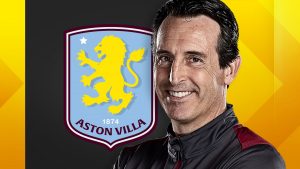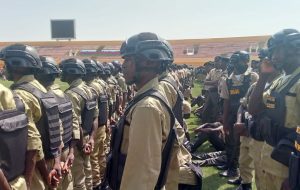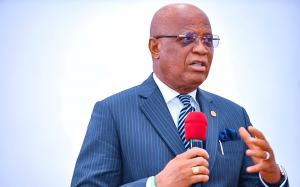Georgia will keep falling short, unless it plays 6 Nations


TOYOTA, Japan (AP) — Georgia needs to play “at least four matches” each year against top sides in order to tackle them competitively when Rugby World Cups come around every four years.
That’s the view of the team coach, New Zealander Milton Haig, who says the gap to sides like Wales will remain too big to close unless Georgia gets into the Six Nations. He was speaking after Georgia lost 43-14 to Grand Slam winner Wales, which led 29-0 at halftime and scored the fastest try of the tournament so far after two minutes. By the time Georgia got its act together, the game was long gone.
Haig has been in charge of Georgia for eight years and he’s been shouting his claim for a long time. But still isn’t sure he’s being heard.
“I’ve constantly been beating this drum. I’ve voiced my opinion a number of times to world rugby, directly and via the media. Will there be any change? Not sure in the long run,” Haig said. “A constant competition like the Six Nations is really beneficial for us if we’re going to compete with teams like Wales.”
Georgia has won eight of the last nine Rugby Europe Championships, the next level below the Six Nations. But last November when it met Italy, usually the worst team in the Six Nations, the Italians won 28-17. Scotland was the first tier one side ever to visit Georgia, last month. Scotland won 44-10.
Rustiness wore off in the second half when Georgia pushed Wales hard in the scrum and matched the Six Nations Grand Slam winner 2-2 in tries. Georgia believes there should be promotion and relegation between the Six Nations and Rugby Europe Championship. Six Nations organizers have turned down the request.
“If Georgia wants to progress in its quality and how it plays its rugby, a competition like the Six Nations is absolutely vital,” Haig said. “We’re not used to playing at this speed. And 29 points in the first half shows us that if you make a mistake, good teams like this, they’ll kill you.
“It’s just learning from the experience of playing these teams more often, even if we don’t get in the Six Nations. Georgia needs to have at least four matches a year against leading teams. The young boys who came off the bench, they’re the future of our team. As I’ve said many times in the last few years, the younger players we have coming through are fantastic.”
With its colossal forwards, grit and grind, Georgia’s notoriously strong in the pack.
But as a tiny nation where rugby is popular, Georgia carries little weight on the international scene.
So Haig is not getting his hopes up.
“When they make the (international rugby) schedule it’s pretty much done 10 years in advance, so the small boys like us, we scramble for scraps once every four years. We go to the table and fight for what we can get. It doesn’t suit us, obviously.”









